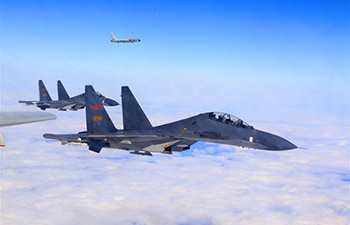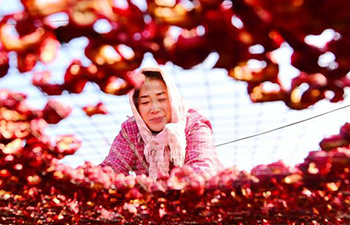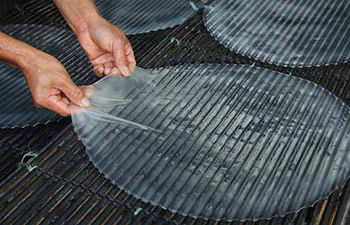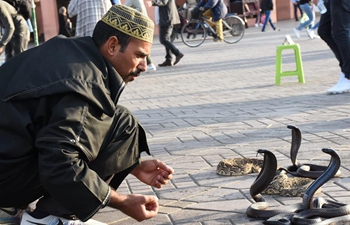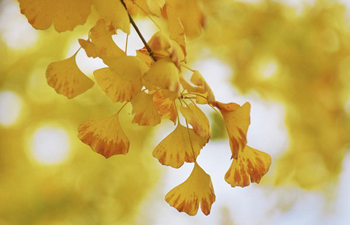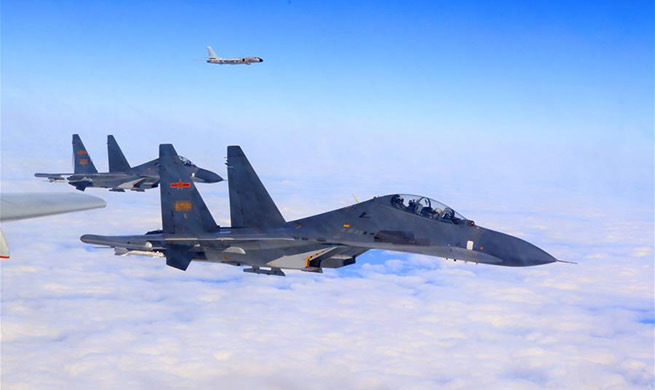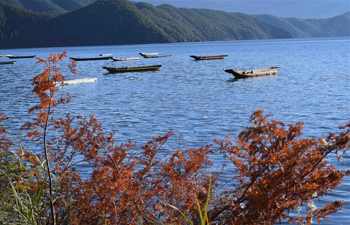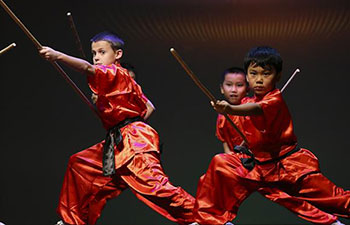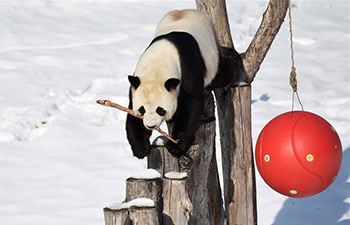by Levi J Parsons, Zhang Ning, Yang Jingzhong
PORT MORESBY, Nov. 14 (Xinhua) -- Nestled away in tropical waters off the east coast of Papua New Guinea (PNG), Kiriwina Island, a palm tree laden paradise, is largely untouched by the modern world.
Most of the island residents still live a tribal life, hunting, fishing and hand-making their clothing and huts.
But despite the beauty and allure of this idyllic South Pacific setting, the island and its people have been plagued by the devastating disease of malaria for years.
With a population of around 40,000 people, there were 179 reported cases per 1,000 people in 2016, according to the figures from a Chinese anti-malaria team, co-organized by China's Guangdong New South group and Guangzhou University of Chinese Medicine.
Last year, the Chinese anti-malaria team chose Kiriwina Island to start a treatment project, using a combination of modern medical science and the wisdom of ancient Chinese medicine.
Dr. Deng Changsheng, a key member of the Chinese team, told Xinhua that his squad helped the island set up an anti-malaria working task force, including a supervisor in charge of the whole island system, scores of regional operators and medics in almost all villages.
From March to June this year, the village medics, under the supervision of the Chinese team, distributed the anti-malaria medicine with Artemisinin as its main ingredient, for three rounds.
Now the island is over 99 percent malaria free, according to the statistics from the Chinese medical team.
MODERN MEDICINE INSPIRED BY ANCIENT WISDOM
The Chinese cure is mainly focused on plasmodium-killing, rather than eradication of mosquitoes, "as mosquitoes are impossible to eradicate," according to Zhu Layi, head of the anti-malaria mission and president of the New South group.
Up until 1969, researchers around the world had screened over 240,000 compounds during the fight against malaria, according to the World Heath Organization.
Seeing no progress, Chinese scientist Tu Youyou decided to dig in the traditional Chinese medicine for a solution.
In an ancient Chinese medical book, she found a treatment for severe fever which mentioned the use of a particular plant called Artemisia annua - more commonly known as sweet wormwood.
High fever is a major symptom of malaria. She thus decided to do further research, and eventually developed an effective cure for the deadly disease.
Credited with saving the lives of countless people around the world, in 2015, Tu was awarded with a Nobel Prize for her research into malaria and became the first Chinese woman ever to be granted the prestigious honor.
CHINA'S "ARTEMISININ MISSION"
Since the start of this century, the Chinese anti-malaria team has been implementing the "Artemisinin mission" in malaria-plagued countries including Cambodia, Comoros, Malawi, Togo and Kenya, achieving outstanding results.
Causing a wide range of extremely severe symptoms including vomiting, muscle pain, headaches, convulsions, delirium and coma, the mosquito-borne disease is responsible for the deaths of over 1 million people per year.
With the majority of deaths occurring in Africa, the region was prioritized by the Chinese medical team. In Comoros, before the operation started in 2007, there were 100,000 cases of malaria every year, but as of 2017, the figure dropped over 98 percent to 1,300 cases and the government now believes Comoros will be completely malaria free by 2020.
Zhu, the major sponsor of the Chinese anti-malaria effort, told Xinhua that "we made it in Comoros and we will make it in PNG."
ANTI-MALARIA MISSION SET TO EXPAND ACROSS PNG
Accessible only by a plane trip to a separate nearby island followed by hours of boat journey, the remoteness and isolation of the Kiriwina Island allows Chinese scientists to track data and measure the effectiveness of the project more easily, as the island acts as a controlled environment with few variables.
Philon Tivirari, a Papua New Guinean working at the local anti-malaria center, told Xinhua that "there was a time I was attacked by malaria once every month. When I heard the anti-malaria project succeeded in Kiriwina, I came here immediately to apply for a job because I think it's so meaningful."
"My family and I all took the Chinese anti-malaria medicine, and I want to tell Papua New Guineans, the Chinese medicine is really working."
With an effective rate of 99 percent on the Kiriwina island, the Chinese medical team is now preparing to extend the "Artemisinin mission" to the whole province, then throughout the country, with an ultimate goal of eradicating malaria in PNG, said Li Guoming, a research member.
"As the governments of China and PNG have been enhancing their cooperation, we are confident that the mission will be accomplished across the nation," said Li.




